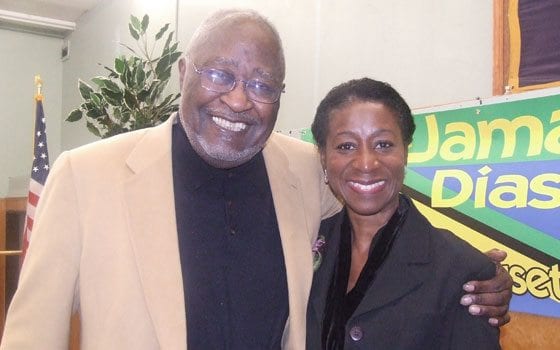
Geneive Brown Metzger, consul general of Jamaica to New York, spoke to Bostonians of Jamaican descent last Thursday at Dorchester’s William E. Reed Auditorium about ways they can support the Caribbean nation’s struggling economy.
According to John Wilcox of the Jamaica Tourist Board, promoting new business ventures on the island and trumpeting Jamaica as a vacation destination are two key elements.
“More investments for our country mean more opportunities for our people,” said Wilcox, who was on hand to present information on innovations the island is implementing to attract more visitors, including the development of new luxury hotels and the refurbishing of Donald Sangster International Airport in Montego Bay.
“Ask not what Jamaica can do for you, but what you can do for Jamaica,” he said.
Though the global economic downturn has particularly hit hard developing countries, Jamaica has been able to stay afloat in large part because of its tourism industry.
But repaying high-interest loans to financial institutions like the International Monetary Fund and World Bank and recovering from recent hurricanes that devastated the island have made it difficult for Jamaicans still on the island to prosper.
According to Brown Metzger, the Jamaican government is prioritizing how to bring more economic development to the island through direct foreign investment to its citizens with the help of the worldwide Jamaican Diaspora — those individuals of Jamaican descent who have left the island and settled elsewhere.
“Embassies and consulates are being asked to be involved in more than just passports,” she said. “We as Jamaican Americans need to think about developing more trade and investment opportunities for those back home.”
Brown Metzger recommended that Jamaicans who have U.S. citizenship renew their Jamaican passports, even if they are well past their expiration dates. She said that dual citizenship is not only welcomed in Jamaica, but it also shows pride and allows Jamaican Americans to come back to the island to work and conduct business.
The consul also noted that beginning this month, Jamaicans can also apply for the Caribbean Community (CARICOM) common passport, which also allows nationals to work in any of the community’s 11 member nations.
“Now more than ever, we have to understand how the global economy works and appreciate the benefits it brings,” she said.
Brown Metzger stressed the importance of supporting tourism on the island. U.S. Airways now operates two nonstop flights between Boston and Montego Bay on weekends, and Air Jamaica is developing similar flight patterns for service in the near future. Wilcox encouraged Jamaican Americans to engage in grassroots marketing by “selling” their homeland as a potential vacation destination.
Boston-based Jamaicans have undertaken a number of business endeavors aimed at supporting the Jamaican economy. Last summer, Kenneth Guscott, the outgoing honorary consul general of Jamaica to Boston, and Boston Diaspora Ventures LLC entered into a collaborative agreement with the All Island Bee Farmers Association to help reinvigorate honey production in the nation for international distribution. The idea for the venture came from a number of Jamaicans living here who felt the need to give back.
Now that he is retiring, Guscott said he hopes that his replacement and other Jamaicans in Boston will not only follow his example, but will also see that economic development is the key to curbing another pressing problem on the island — crime.
“[Our business venture] will give kids the opportunity to sell honey and not ganja,” he said.
Guscott’s claim touched on a larger problem that concerned many in the audience at the Russell Auditorium: Why invest all this time and effort to promote traveling to Jamaica if many nationals who left the island now fear that if they go back, they will become victims of violence?
Jamaica has the third highest murder rate of any nation in the world, according to the United Nations. Audience members shared personal stories of home break-ins and shootings in their hometowns, portraying a vastly different picture of Jamaica than most tourists are accustomed to seeing.
Other attendees were wondered aloud if the estimated $2 billion in tourism money coming into the island annually is trickling down to the poorest populations, who sometimes resort to crime as another source of income.
Consul General Brown Metzger said that the Jamaican government sees crime as a “serious problem” and is pulling out all the stops to bring the murder rate down, working with police authorities in the United Kingdom and the United States. But she also blamed the U.S. Department of Homeland Security for deporting back to the island Jamaican nationals who have little or no access to economic opportunities once they return.
“Crime on the island is a result of what is happening in the United States,” she said. “It is a sensitive issue many don’t like to take about, but we have to be honest about what is going on.”
Despite the concerns, Brown said that members of the Jamaican Diaspora can be the “best ambassadors for the country” and should promote the idea of a more economically secure Jamaica.
“These are challenging times for us,” she said. “During these times, we should pull together.”






